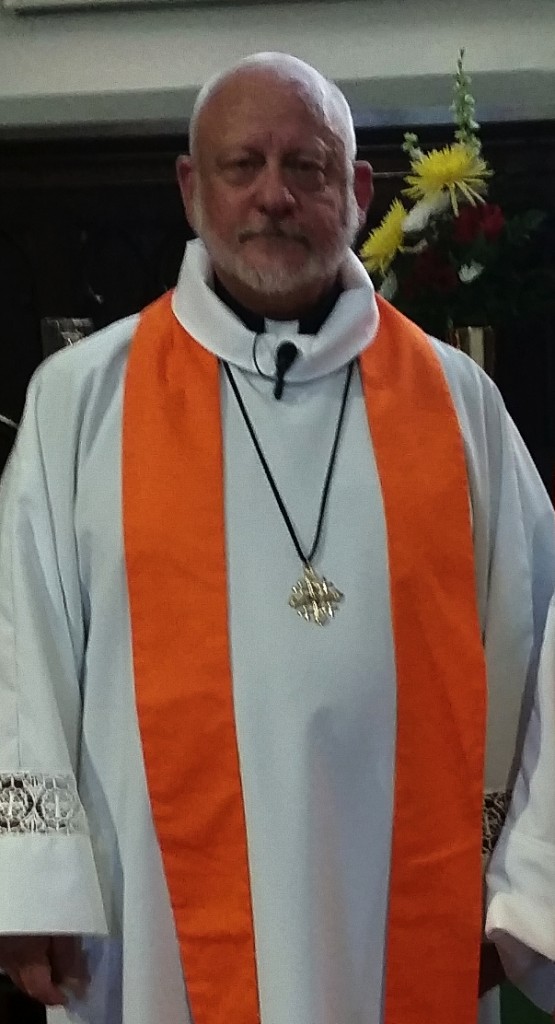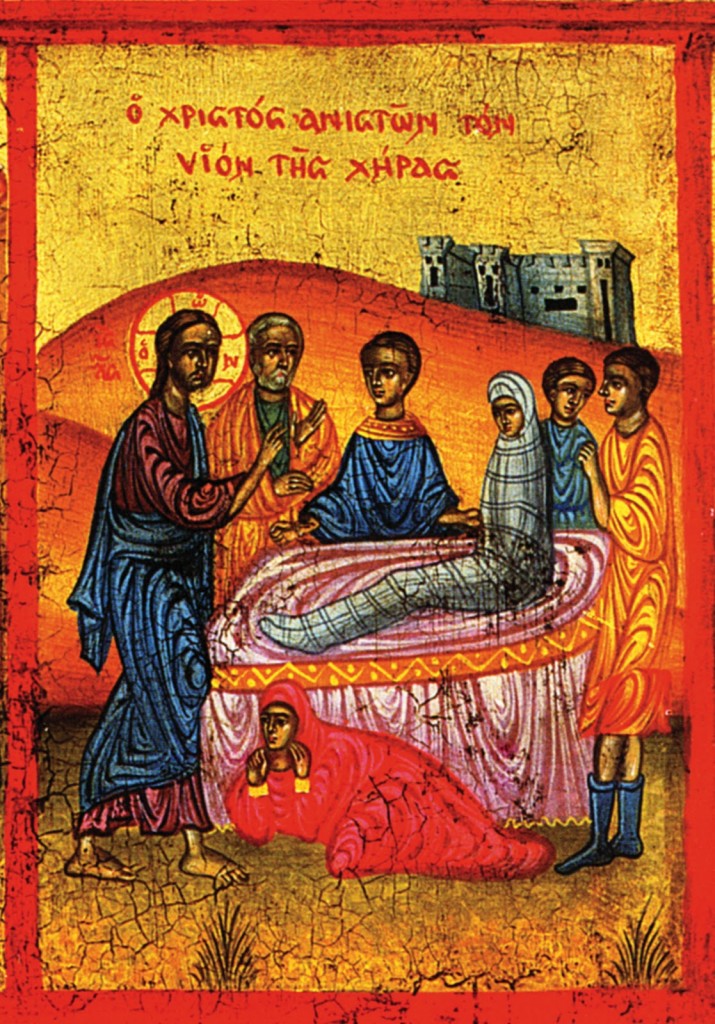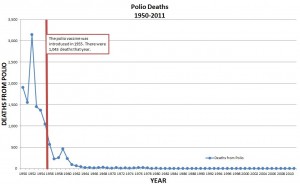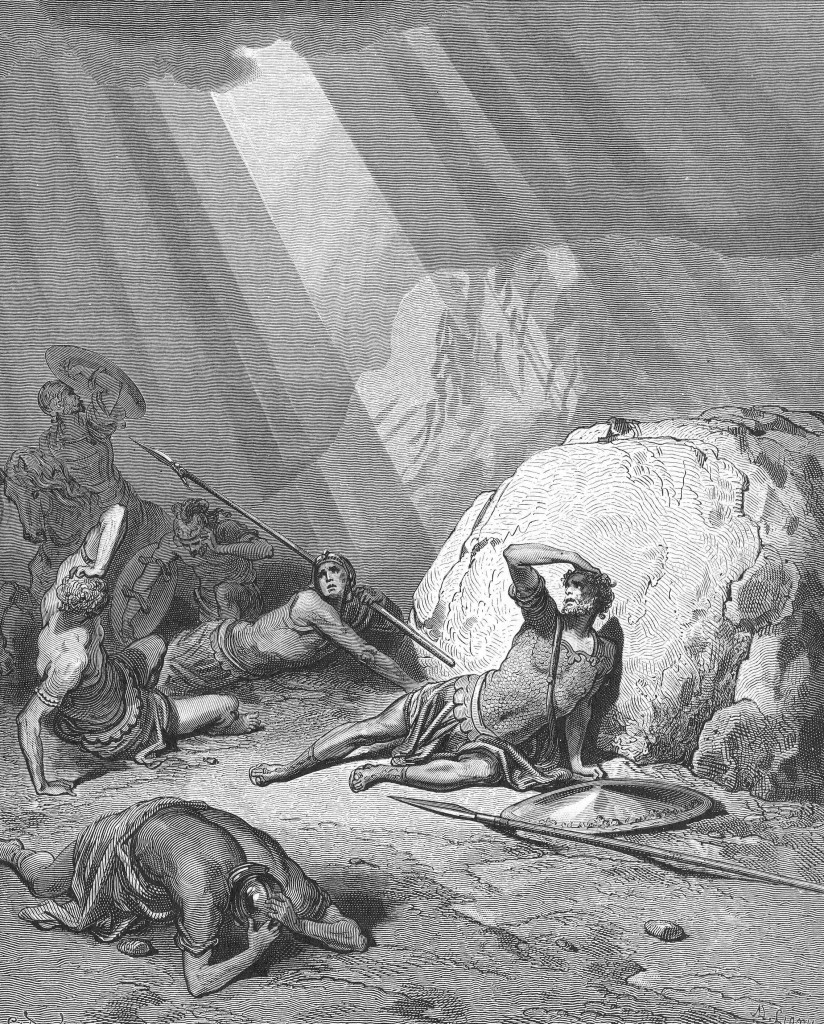====================
A homily offered on January 22, 2017, by the Rev. Dr. C. Eric Funston at the 200th Annual Parish Meeting of St. Paul’s Episcopal Church, Medina, Ohio, where Fr. Funston is rector.
(The lessons for the day are those for the Conversion of St. Paul the Apostle: Acts 26:9-21; Psalm 67; Galatians 1:11-24; and St. Matthew 10:16-22. These lessons can be read at The Lectionary Page.)
====================
 May God be merciful to us and bless us, show us the light of his countenance and come to us. (Ps. 67:1) Amen.
May God be merciful to us and bless us, show us the light of his countenance and come to us. (Ps. 67:1) Amen.
Have you ever been knocked off a horse? I have. Twice. Once when I was 11 and again when I was 24. Different circumstances and if you promise not to laugh, I’ll tell you about them when we have our luncheon after the business meeting. In both instances, however, one element was the same: landing flat on my back, having the wind knocked out of me, and being stunned not quite to unconsciousness. Both times it was a startling and uncomfortable experience.
The story of Paul’s conversion is told not once but four times in the pages of the New Testament; three times in the Book of Acts and once in Paul’s letter to the Galatians. Although not mentioned in any of those descriptions, artists often depict Paul falling from a horse or donkey. When I read or hear the story, therefore, I have some sympathy for Paul. In addition to being knocked flat on his back, having the wind knocked out of him, and being mentally stunned, his incident included a blinding light, an encounter with a living rabbi he was convinced was dead, and the voice of God, and it was followed by three days of blindness. Now that’s an experience!
Now this is homily is supposed to be both a sermon and the rector’s report for the 200th Annual Meeting of the parish. Were I to focus on the second purpose, I could give you a lot of history – but I did that at our Bicentennial Choral Evensong on the Feast of the Epiphany, so I won’t do that. I could give you a summary of all the good things and some of the not-so-good things that have happened in the last year – but you can read the various ministry reports and the financial statements in the Annual Journal for yourselves. I could tell you about all the wonderful things planned for the coming year – but, again, you have the Annual Journal in your hands with the bicentennial event calendar and the 2017 Budget, so there you have it.
A rector’s report would merely repeat things you already know or have available to you in that Journal. So this will be more of a homily and less of a report, more (I hope) of a proclamation of a theology for the future and much less a review of the past. I am convinced that God is merciful to us, does bless us, illumines the way with the light of his countenance, and comes to us every day. Perhaps God does not come to us as dramatically as the Risen Lord came to Paul . . . or perhaps he does and we just don’t recognize it. We may be getting knocked off our horses regularly and we may simply be too oblivious to notice.
A canon of Durham Cathedral a few years ago preaching on these same texts said:
The experience of a light, of falling, an involuntary act of submission doubtless sending him into great fear and shock, was further heightened by a voice, “Saul, Saul, why are you persecuting me?” Saul’s reply uses the divine title “Lord”, “Who are you, Lord?” He recognizes that this is something from heaven, while being unsure of exactly who it is that is speaking. The response was, “I am Jesus, whom you are persecuting”. Of course, those words are moving words; Jesus makes no distinction between himself and his disciples; in persecuting them, Saul was persecuting him. It is a narrative illustration of the kind of mystical theology that Paul was later to develop in his letters; through faith and baptism we are mystically joined to Christ, incorporated in him – we become his body; he indwells us and we indwell him. (St Paul’s Conversion, the Rev. Canon David Kennedy, Durham Cathedral, Church of England)
This is an everyday truth and if we recognized it every day, it would bowl us over, just like being knocked from a horse. I am reminded of the observation of Annie Dillard, in her book Teaching a Stone to Talk (Harper & Row 1982), makes this point in an oft-quote observation:
Does any-one have the foggiest idea what sort of power we so blithely invoke? Or, as I suspect, does no one believe a word of it? The churches are children playing on the floor with their chemistry sets, mixing up a batch of TNT to kill a Sunday morning. It is madness to wear ladies’ straw hats and velvet hats to church; we should all be wearing crash helmets. Ushers should issue life preservers and signal flares; they should lash us to our pews. For the sleeping god may wake some day and take offense, or the waking god may draw us out to where we can never return. (Dillard, Annie, Teaching a Stone to Talk: Expeditions and Encounters, Harper & Row, New York:1982, pp 40-41.)
Every time we celebrate the Holy Eucharist, after the presider has said Jesus’ words over the bread and wine – “This is my Body” – “This is my Blood” – we are invited to affirm the powerful everyday-ness and everyday power of Jesus’ presence, “Therefore we proclaim the mystery of faith:”
Christ has died.
Christ is risen
Christ will come again (BCP 1979, p 363)
These words remind us that Jesus is here with us now:
The person Jesus and his story are now.
The forgiveness and hope he offers are now.
The invitation and the expectation for us to change and to grow through his love and presence are with us are now.
The renewal, vision and hope that transformed Paul from bigotry and narrow-mindedness are open to us now.
But, only if we have the faith and the courage to respond: to get up and follow Jesus. (Sermon at All Saints, the Rev. Alan Wynne, Parish of Poplar, Church of England)
You know . . . the getting up part is really important! Getting knocked of the horse isn’t the whole of Paul’s conversion; it was just the beginning. In Paul’s own description of his conversion in our reading from Galatians we can see that it took some time; including going into retreat in the Arabian desert and then a three-year delay before he went to Jerusalem to meet the original apostles. In the early church, entry into the worshiping community replicated Paul’s experience. The training for baptism, called “catechesis,” often took years, typically three, before someone was “exposed to the very real risks and challenges of full membership of the Christian faith” and admitted to full participation in the mysteries of the Holy Communion and full responsibility for the mission and ministry of the church. As English priest David Rowett says,
Conversion isn’t some once-and-for-all process, over in a blinding flash, not even for the Pharisee from Tarsus. It is a life-long process of deepening and learning which may begin in one moment – with or without a donkey – but then requires working out throughout the rest of our lives, and in the company of other pilgrims. (Conversion of St Paul, the Rev. David Rowett, St Mary’s Church, Barton-on-Humber, Church of England)
Our conversion is an on-going and everyday truth and if we recognized it every day, it would bowl us over. Like Paul, however, we couldn’t just lie there stunned. Jesus would say to us as he said to Paul . . . indeed, Jesus does say to us, “Get up, you will be told what you have to do.”
In the Gospel lesson today, Jesus promised his first twelve followers that they would be handed over to councils, flogged in religious institutions, and dragged before secular rulers, but he told them not to worry about making a defense because, in words similar to those he would say to Paul on the Damascus Road, “What you are to say will be given to you at that time.”
I think it helpful to remember who Jesus is talking to in both stories. Talking to the Twelve he is not talking to the stained-glass saints they have become; he is talking to hide-bound, conservative, Law-abiding Jews. He is talking to Peter who, even after spending all that time with Jesus and going through the events of Jesus’ trial, execution, burial, and resurrection, would say, “I have never eaten anything that is profane or unclean” and would refuse to eat with Gentile Christians. He is talking to Thomas who is portrayed as a skeptic, a doubter, and something of a pessimist. He is talking to Simon the Zealot, who may have been a member of that Jewish sect noted for its uncompromising opposition to Rome and pagan practices. And on the road to Damascus, he is addressing Saul of Tarsus, a Pharisee set upon the path of persecuting and, indeed, destroying the fledgling Christian church.
Jesus in both the Gospel lesson and in the story from Acts is speaking to men who exhibit an attitude we still see in the church and in our society today – it is nothing new – an attitude characterized by bigotry, zeal, closed-mindedness, tunnel vision, intolerance, and exclusivity. “In varying degrees it may be present in each one of us:
our lack of openness to new ideas;
our total certainty that in all matters of faith, morality or ritual we are right and others are wrong;
the ease with which we judge or condemn those who see things differently;
the way we cling uncritically to the traditions and practices of the past;
our failure to see God’s continuing presence and work in creation;
our desire to contain God in our pockets and limit him to our shrines where he can be controlled and we can be cosy and unchallenged;
the way we call Jesus “Lord” and ignore the most basic of his teachings about love and respect for others.” (Alan Wynne, op. cit.)
When we discussed this Gospel passage during our bible study time at Monday’s last meeting of the 2016 Vestry, someone suggested that Jesus seems to be foreshadowing what would happen later to himself. While that is true, he is also, by forecasting this experience, demonstrating his authority and intimacy with God. His words assure the Twelve and us that:
Opposition is not a sign of failure or that Jesus was not trustworthy as a leader. And
Paradoxically, getting arrested is the only way you will have a chance to speak to the elites, so use it to testify. And [again]
Don’t worry about what you will say – God’s Spirit will speak through you. (Holy Textures, the Rev. David Ewart, United Church of Canada)
Quite a while after the event in today’s Gospel lesson, “the disciples came to Jesus and asked, ‘Who is the greatest in the kingdom of heaven?’ He called a child, whom he put among them, and said, ‘Truly I tell you, unless you change and become like children, you will never enter the kingdom of heaven. Whoever becomes humble like this child is the greatest in the kingdom of heaven.'” (Matt 18:1-4)
In the last sermon he ever preached, Dr. Martin Luther King, Jr., said of this story:
Jesus gave us a new norm of greatness. If you want to be important – wonderful. If you want to be recognized – wonderful. If you want to be great – wonderful. But recognize that he who is greatest among you shall be your servant. That’s a new definition of greatness . . . . It means that everybody can be great because everybody can serve. You don’t have to have a college degree to serve. You don’t have to make your subject and your verb agree to serve. You don’t have to know about Plato and Aristotle to serve. You don’t have to know Einstein’s theory of relativity to serve. You don’t have to know the second theory of thermodynamics in physics to serve. You only need a heart full of grace, a soul generated by love. And you can be that servant. (Drum Major Instinct, Dr. Martin Luther King, Jr., preached February 4, 1968)
You can be that servant. You are that servant. “Get up, you will be told what you have to do.” “Do not worry about how you are to speak or what you are to say; for what you are to say will be given to you.”
Two hundred years ago a few men and women living in Weymouth, Ohio, heard God speaking to them and founded this parish. In Annie Dillard’s words, the waking god drew them out to where they could never return. They got up because they heard the call of Jesus telling them what they had to do, and here we are as a result. I firmly believe that everyday Jesus is still speaking to his Church – to you and to me – still knocking us off of our horses and then saying “Get up, you will be told what you have to do.”
On Friday morning, Donald J. Trump was sworn in as the 45th President. You may feel that’s a good thing; you may feel that’s a bad thing. But feelings and opinions are irrelevant; it is a fact; it is reality. He and his party colleagues in the congress will change the spending priorities of our government; this is the way our democratic system works. Already his administration has announced plans to cut funding to and to cancel a variety of government programs including some which support the arts and humanities, some which fund educational endeavors, some which fund housing projects, some which fund health care, some which fund food assistance programs. You may feel that this budget-cutting is a good thing; you may feel that it’s a bad thing. But feelings and opinions are irrelevant; it is reality.
We can all agree on reality – that there are hungry people to feed, sick people to care for, homeless people to house, and students to educate. And this reality means that if there are fewer government-funded programs to do these things, charities and charitable institutions, such as churches, church-run schools, nonprofit hospitals and clinics, volunteer food banks, and the like, are very likely to be called upon to take up new ministries to replace what is no longer being done by government-funded agencies. Whether we think this a good thing or a bad thing, it is reality. It is as real as being knocked off a horse, and like Paul we – the church – can’t just lay there. “Get up, you will be told what you have to do.” There are hungry people to feed, sick people to care for, homeless people to house, and students to educate. “And the king will answer, ‘Truly I tell you, just as you did it to one of the least of these who are members of my family, you did it to me.’” (Matt 25:40)
During this last week, two lessons in the Lectionary have stood out for me: one is the Old Testament lesson for the Fourth Sunday after the Epiphany (that’s next Sunday and, yes, clergy do read ahead) and the other is yesterday’s Epistle lesson for the Daily Office. They speak to me, and I hope to you, about what it is we have to get up and do. The first is this from the Prophet Micah:
He has told you, O mortal, what is good;
and what does the Lord require of you
but to do justice, and to love kindness,
and to walk humbly with your God? (Micah 6:8)
The other is from Paul’s letter to the Ephesians:
Stand . . . and fasten the belt of truth around your waist, and put on the breastplate of righteousness. As shoes for your feet put on whatever will make you ready to proclaim the gospel of peace. With all of these, take the shield of faith, with which you will be able to quench all the flaming arrows of the evil one. Take the helmet of salvation, and the sword of the Spirit, which is the word of God. (Eph 6:14-17)
Two hundred years ago, that small band of Episcopalians in Weymouth got up because there was work to be done. Now it is our turn. Every day it is our turn. Get up! Get dressed! There is work to be done. And we have been told what we have to do.
We stand at the beginning of a new century for our parish, at the beginning of a new administration for our country. We pray for the new President and we pray for ourselves. May God be merciful to us and bless us, show us the light of his countenance and come to us. Amen.
(Note: The illustration is The Conversion Of St Paul by Girolamo Francesco Maria Mazzola, a/k/a Parmigianino, (1527-1528). It hangs in the Kunsthistorisches Museum, Vienna, Austria.)
====================
Father Funston is the rector of St. Paul’s Episcopal Church, Medina, Ohio.
 Good evening! For those who don’t know me, I am Eric Funston, a priest of the Episcopal Church and rector of St. Paul’s Parish in Medina, Ohio. For those of you who don’t know why I’m preaching here tonight . . . I wish I could tell you! Usually these ordination or installation homily gigs go to someone with whom the new clergy person has had a, shall we say, formative relationship: a former pastor, a seminary professor or a ministry supervisor, an elder minister under whom the new pastor served a curacy, someone responsible for the priestly formation of the new rector. But that doesn’t describe me . . . I am not responsible for George Baum ~ and that is very probably a good thing!
Good evening! For those who don’t know me, I am Eric Funston, a priest of the Episcopal Church and rector of St. Paul’s Parish in Medina, Ohio. For those of you who don’t know why I’m preaching here tonight . . . I wish I could tell you! Usually these ordination or installation homily gigs go to someone with whom the new clergy person has had a, shall we say, formative relationship: a former pastor, a seminary professor or a ministry supervisor, an elder minister under whom the new pastor served a curacy, someone responsible for the priestly formation of the new rector. But that doesn’t describe me . . . I am not responsible for George Baum ~ and that is very probably a good thing! 
 As many of you know, this past week was a harrowing one for my wife and for me; specifically, Wednesday was one of those days you would rather not have to live through. In the afternoon, I was told by a urologist that I probably have prostate cancer, and later that night Evelyn nearly died from pulmonary embolism. She is OK now – I will be leaving right after this service to bring her home from the hospital – and my diagnosis will be either confirmed or proven wrong by a biopsy in about a month.
As many of you know, this past week was a harrowing one for my wife and for me; specifically, Wednesday was one of those days you would rather not have to live through. In the afternoon, I was told by a urologist that I probably have prostate cancer, and later that night Evelyn nearly died from pulmonary embolism. She is OK now – I will be leaving right after this service to bring her home from the hospital – and my diagnosis will be either confirmed or proven wrong by a biopsy in about a month.  Twenty-four years and 363 days ago I was made a priest; some what more than a year more than that, I have been a deacon. I have been in parish ministry for more than 26 years and on Tuesday I will celebrate the 25th anniversary of my ordination to the Sacred Prebyterate.
Twenty-four years and 363 days ago I was made a priest; some what more than a year more than that, I have been a deacon. I have been in parish ministry for more than 26 years and on Tuesday I will celebrate the 25th anniversary of my ordination to the Sacred Prebyterate. I am convinced that there is no grief quite so profound as that of a mother whose child has died. I know that fathers in the same situation feel a nearly as intense sorrow at the death of their sons or daughters, but having spent time with grieving parents, I am convinced that the grief of a mother faced with the loss of her child is the deepest sadness in human experience.
I am convinced that there is no grief quite so profound as that of a mother whose child has died. I know that fathers in the same situation feel a nearly as intense sorrow at the death of their sons or daughters, but having spent time with grieving parents, I am convinced that the grief of a mother faced with the loss of her child is the deepest sadness in human experience. The year that I was born was the worst of the mid-20th Century polio epidemic; about 55,000 Americans contracted the disease that year and more than 3,100 died, mostly children. As a society, we decided that that much illness and death was simply unacceptable, and an all-out effort was underway to put an end to it. Within just a few years, Jonas Salk and his team developed the vaccine which ended the epidemic; a few years later, the Sabin oral vaccine was developed and polio has been just about eradicated throughout the world. (Graphic from
The year that I was born was the worst of the mid-20th Century polio epidemic; about 55,000 Americans contracted the disease that year and more than 3,100 died, mostly children. As a society, we decided that that much illness and death was simply unacceptable, and an all-out effort was underway to put an end to it. Within just a few years, Jonas Salk and his team developed the vaccine which ended the epidemic; a few years later, the Sabin oral vaccine was developed and polio has been just about eradicated throughout the world. (Graphic from  On January 21, 2013, Hadiya Pendleton, a 15-year-old high school student from the south side of Chicago, marched with her school’s band in President Obama’s second inaugural parade. One week later, Hadiya was shot and killed. She was shot in the back while standing with friends inside Harsh Park in Kenwood, Chicago, after taking her final exams. She was not the intended victim; the perpetrator, a gang member, had mistaken her group of friends for a rival gang.
On January 21, 2013, Hadiya Pendleton, a 15-year-old high school student from the south side of Chicago, marched with her school’s band in President Obama’s second inaugural parade. One week later, Hadiya was shot and killed. She was shot in the back while standing with friends inside Harsh Park in Kenwood, Chicago, after taking her final exams. She was not the intended victim; the perpetrator, a gang member, had mistaken her group of friends for a rival gang.  Last week, I gave away the ending of Job. I told you that everything turned out all right in the end, and so it has. Job has repented, not of any sin that warranted his suffering, but of the pride and arrogance (and ignorance) he displayed during his suffering by demanding to confront God. God has forgiven him and to make up for all his loss, his fortunes have been restored many times over. Happy ending! Except not quite . . .
Last week, I gave away the ending of Job. I told you that everything turned out all right in the end, and so it has. Job has repented, not of any sin that warranted his suffering, but of the pride and arrogance (and ignorance) he displayed during his suffering by demanding to confront God. God has forgiven him and to make up for all his loss, his fortunes have been restored many times over. Happy ending! Except not quite . . .  When I was learning the art of preaching, my instructor was a fan of the old Barthian aphorism that a homilist should enter the pulpit with the newspaper in one hand and the Bible in the other. So here I am, newspaper and Bible at the ready, and opening the first I find glaring at me the headline you all have also seen: another mass shooting in America – the 294th multiple gun homicide of the year. Like many, if not most, of the clergy here this evening I have preached too many sermons about mass murder and gun control: after Columbine, after the Aurora theater, after the Milwaukee gurdwara, after Sandy Hook Elementary School, after Mother Emanuel Church, after so many others . . . . I’m sorry; my heart is broken and my prayers arise for the Umpqua College victims, their families, and their community. But, even as we gather to remember the Little Poor Man of Assisi, in whose name we often pray, “make me a servant of your peace,” I just don’t have another mass-murder-gun-control sermon to offer.
When I was learning the art of preaching, my instructor was a fan of the old Barthian aphorism that a homilist should enter the pulpit with the newspaper in one hand and the Bible in the other. So here I am, newspaper and Bible at the ready, and opening the first I find glaring at me the headline you all have also seen: another mass shooting in America – the 294th multiple gun homicide of the year. Like many, if not most, of the clergy here this evening I have preached too many sermons about mass murder and gun control: after Columbine, after the Aurora theater, after the Milwaukee gurdwara, after Sandy Hook Elementary School, after Mother Emanuel Church, after so many others . . . . I’m sorry; my heart is broken and my prayers arise for the Umpqua College victims, their families, and their community. But, even as we gather to remember the Little Poor Man of Assisi, in whose name we often pray, “make me a servant of your peace,” I just don’t have another mass-murder-gun-control sermon to offer. “I heard a voice saying in Hebrew: ‘I have a job for you. I’ve handpicked you to be a servant and witness to what’s happened today, and to what I am going to show you. I’m sending you off to open the eyes of the outsiders so they can see the difference between dark and light, and choose light, see the difference between Satan and God, and choose God.'” (Acts 26:16-18a, The Message)
“I heard a voice saying in Hebrew: ‘I have a job for you. I’ve handpicked you to be a servant and witness to what’s happened today, and to what I am going to show you. I’m sending you off to open the eyes of the outsiders so they can see the difference between dark and light, and choose light, see the difference between Satan and God, and choose God.'” (Acts 26:16-18a, The Message) 

